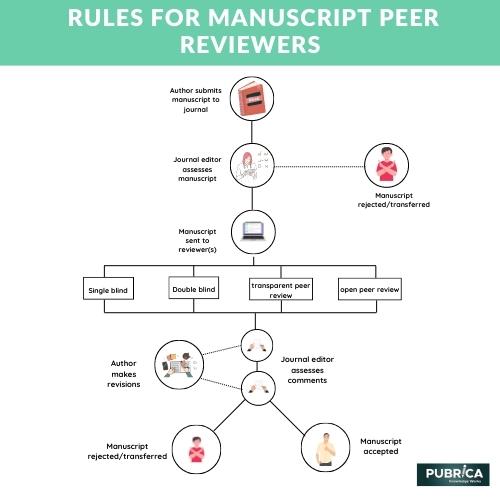What are the Rules For Manuscript Peer Reviewers?
What are the Rules for Manuscript Peer Reviewers?
Peer review is the system used to assess the quality of a manuscript before it is published. Independent researchers in the relevant research area assess submitted manuscripts for originality, validity, and significance to help editors determine whether a manuscript should be published in their journal.
The identity of the reviewers must be kept confidential unless open peer review is used. Reviewers advise and make recommendations; editors make the decisions. Reviewers must assess manuscripts objectively and review the work, not the authors. Editors-in-chief must have full editorial independence.
Ethical Guidelines for Manuscript peer reviewers
Manuscript Peer reviewers must follow these ethical guidelines when reviewing journal articles:
- Reviewers must give unbiased consideration to each manuscript submitted. They should judge each on its merits, without regard to race, religion, nationality, gender, seniority, or institutional affiliation of the author(s).
- Reviewers must declare any conflict of interest before agreeing to review a manuscript. This includes any relationship with the author(s) that may bias their review.
- Reviewers must keep the peer review process confidential. They must not share information or correspondence about a manuscript with anyone outside of the peer review process without the explicit permission of the editor.
- They must not enter unpublished manuscript files, images, or information into databases or tools that do not guarantee confidentiality, are accessible by the public, and may store or use this information for their own purposes (for example, generative AI tools like ChatGPT).
- Reviewers must prepare their report by themselves unless they have permission from the journal to involve another person. They must also not impersonate others during the review process.
- Reviewers must not use artificial intelligence tools to generate manuscript review reports, including LLM-based tools like ChatGPT.
- Reviewers should provide a constructive, comprehensive, evidenced, and appropriately substantial peer review report. Reviewers are responsible for ensuring that any references in their reports are accurate and verifiable.
- Reviewers must avoid making statements in their report which might be interpreted as questioning any person's reputation.
- Reviewers should make all reasonable efforts to submit their reports and recommendation on time. They should inform the editor if this is not possible.
- Reviewers should call the journal editor's attention to any significant similarity between the manuscript and any published paper or submitted manuscripts they know about [1].

Conclusion
In conclusion, manuscript peer reviewers play a crucial role in scholarly publishing. They are entrusted with evaluating research manuscripts' quality, validity, and significance. Adhering to rules and guidelines ensures a fair, objective, and thorough review process. Confidentiality is of utmost importance, and reviewers should treat the manuscripts as confidential documents. Timeliness is vital, as reviewers must complete their reviews within the specified timeframe. Constructive and unbiased feedback helps authors improve their work, and reviewers should provide straightforward suggestions for revisions. Ethical considerations, such as plagiarism and data fabrication, should be carefully assessed and reported if identified. Adherence to journal guidelines, including formatting and referencing requirements, is essential. Reviewers should maintain professionalism, respect, and anonymity as per the journal's policy. By following these rules, manuscript peer reviewers contribute to the integrity and advancement of scientific knowledge.
Give yourself the Medical edge today
Each order includes
- On-time delivery or your money back
- A fully qualified writer in your subject
- In-depth proofreading by our Quality Control Team
- 100% confidentiality, the work is never re-sold or published
- Standard 7-day amendment period
- A paper written to the standard ordered
- A detailed plagiarism report
- A comprehensive quality report

